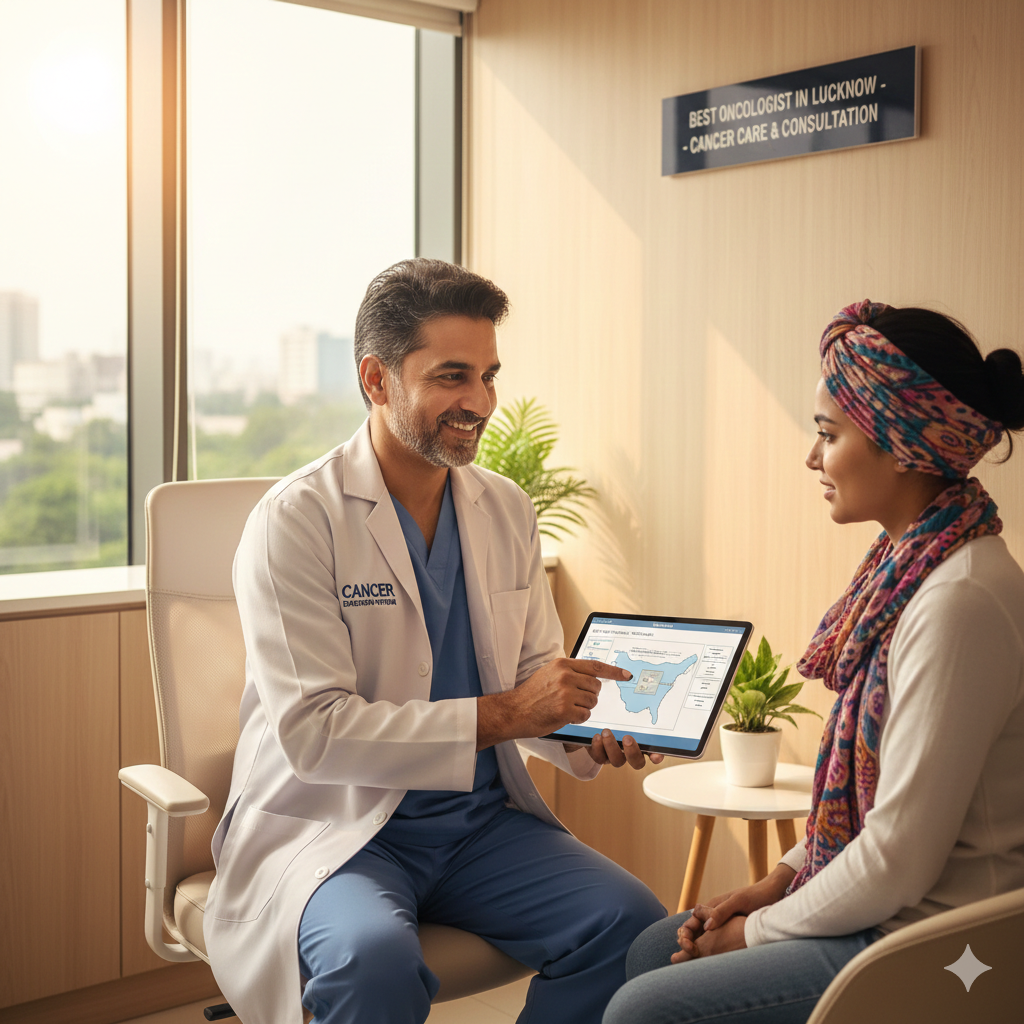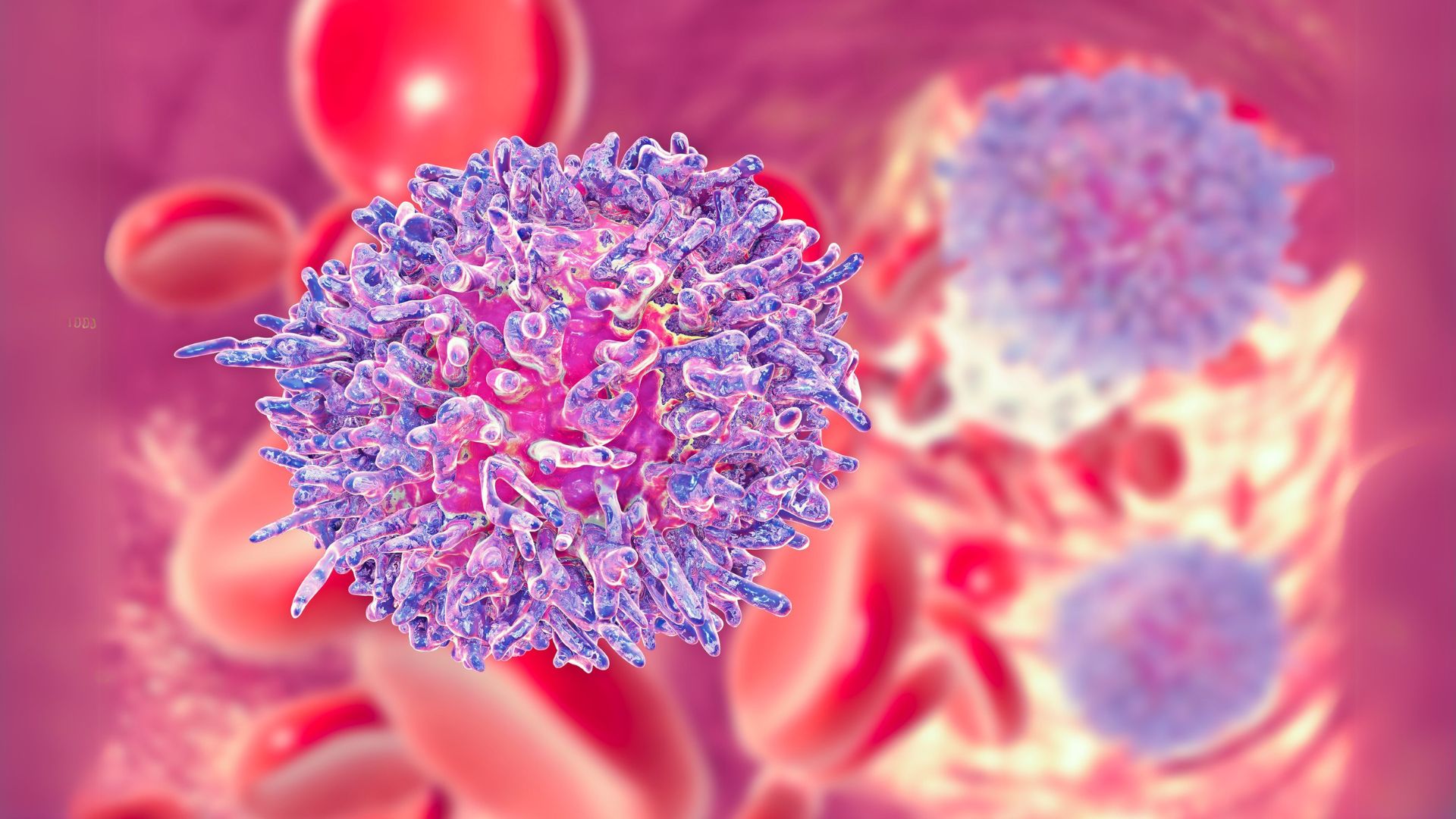A Cancer of the Blood, Not the End of Hope
Expert Insight from a Leukemia Specialist in Lucknow
Leukemia: Silent but Serious
Leukemia is not a tumor you can see or feel. It’s a cancer that begins in the blood and bone marrow — the factories that create red blood cells, white blood cells, and platelets. When leukemia strikes, it disrupts the body’s ability to carry oxygen, fight infection, and stop bleeding. Unlike solid tumors, leukemia spreads through the bloodstream, often affecting the whole body before noticeable symptoms appear.
Globally, over 475,000 new cases of leukemia are diagnosed every year, accounting for about 3% of all cancers. In India, leukemia is the most common blood cancer, with approximately 30,000 to 40,000 new cases each year. It affects both children and adults, with childhood leukemia (particularly Acute Lymphoblastic Leukemia or ALL) making up a significant portion — nearly 25–30% of all pediatric cancers.
📢 Leukemia doesn’t knock — it floods the system.
✅ If you or your loved one has unexplained fatigue, bleeding, or infections, seek expert care from a leukemia specialist in Lucknow today.
What Causes Leukemia?
Leukemia usually starts when abnormal white blood cells form in the bone marrow. These cancerous cells multiply uncontrollably, crowding out normal blood cells. While in many cases, no exact cause is identified, certain risk factors increase the likelihood of developing leukemia.
These include spontaneous genetic mutations, prior exposure to radiation (especially in childhood), certain chemotherapy drugs, genetic syndromes like Down syndrome or Li-Fraumeni, and industrial exposure to chemicals like benzene. Smoking is also linked to a higher risk of developing Acute Myeloid Leukemia (AML). Still, it’s important to note that leukemia is not contagious — and most patients did nothing to “cause” it.
✅ Early detection and medical guidance are critical — especially when risk factors are present.
Recognizing the Symptoms of Leukemia
The symptoms of leukemia often resemble common illnesses like viral infections or anemia. Fatigue, low-grade fever, and body aches may appear ordinary, but when persistent or combined with other signs, they warrant attention.
Common warning symptoms include ongoing fatigue or weakness, frequent fevers or infections, easy bruising, bleeding gums or nose, pale skin, and shortness of breath. Bone or joint pain and swelling of lymph nodes or the spleen may also be early signs. Tiny red skin spots known as petechiae and unexplained weight loss are additional red flags.
📢 When your blood is sick, your body speaks. Listen to it.
✅ If these symptoms linger, don’t delay. A leukemia specialist in Lucknow can help with early diagnosis.
Types of Leukemia and How It’s Diagnosed
Leukemia is classified based on how quickly it develops (acute vs. chronic) and which blood cell line is affected (myeloid vs. lymphoid). This leads to four major types:
- Acute Lymphoblastic Leukemia (ALL): Common in children, aggressive but highly curable.
- Acute Myeloid Leukemia (AML): Seen more in adults and seniors; requires urgent care.
- Chronic Lymphocytic Leukemia (CLL): A slow-growing leukemia seen mostly in older adults.
- Chronic Myeloid Leukemia (CML): Driven by a specific genetic mutation (Philadelphia chromosome) and treated effectively with targeted therapy.
Diagnosis begins with a Complete Blood Count (CBC), which often gives the first clue. A peripheral smear may reveal abnormal “blast” cells. Bone marrow biopsy confirms the diagnosis and helps determine the subtype. Specialized tests such as flow cytometry, cytogenetic analysis, PCR, and FISH are used to identify mutations and guide therapy. In cases like ALL, a lumbar puncture may also be needed to check for spread to the brain and spinal cord.
🏥 Your leukemia specialist in Lucknow will personalize the diagnostic process and explain what your test results mean for your treatment.
Treatment Options for Leukemia: Personalized and Precise
Leukemia treatment is not one-size-fits-all. It depends on your type of leukemia, age, overall health, genetic mutations, and how far the disease has progressed.
1. Acute Lymphoblastic Leukemia (ALL)
Treatment involves three phases — induction, consolidation, and maintenance. CNS prophylaxis (chemotherapy injected into the spine) is essential to prevent spread to the brain. Most children with ALL are cured, with survival rates over 80–90%. Adults have slightly lower survival rates but benefit from targeted drugs like imatinib or dasatinib in Philadelphia-positive ALL. Immunotherapy (like blinatumomab or inotuzumab) and CAR-T cell therapy offer new hope in relapsed cases.
2. Acute Myeloid Leukemia (AML)
AML typically starts with an aggressive induction phase using chemotherapy (“7+3” regimen). This is followed by consolidation, often with high-dose cytarabine. Bone marrow transplant is recommended for intermediate- or high-risk AML. New targeted agents — like midostaurin for FLT3 mutations or enasidenib/ivosidenib for IDH mutations — are improving outcomes. Venetoclax-based combinations are helpful for elderly or unfit patients.
3. Chronic Lymphocytic Leukemia (CLL)
Many patients with early-stage CLL don’t need immediate treatment. Therapy is considered when there’s anemia, low platelets, rapid disease progression, bulky lymph nodes, or symptoms. Targeted treatments such as ibrutinib, acalabrutinib, and venetoclax (often in combination with obinutuzumab) are now preferred over traditional chemotherapy.
4. Chronic Myeloid Leukemia (CML)
CML is primarily managed with tyrosine kinase inhibitors (TKIs) like imatinib, dasatinib, or nilotinib — oral pills that control the disease effectively. Most patients lead a normal life on daily medication. In some, remission is deep enough to allow for treatment-free survival, a goal under active research.
Bone Marrow Transplant: A Curative Option for Some
Bone marrow transplant (BMT) may offer a cure in high-risk or relapsed leukemia cases, especially for younger patients with matched donors. It’s commonly used in relapsed ALL and AML or in resistant CML cases. The decision to pursue BMT depends on overall fitness, donor availability, and leukemia subtype — and must be made in consultation with a specialized leukemia expert.
The Role of Targeted Therapy and Immunotherapy
Modern treatments focus on attacking leukemia cells without harming the rest of the body.
Targeted therapies include:
- Imatinib, Dasatinib (CML)
- Midostaurin, Ivosidenib, Enasidenib (AML)
- Venetoclax, Acalabrutinib (CLL)
Immunotherapies such as blinatumomab and CAR-T cell therapy are revolutionizing care for relapsed leukemia, especially in children and young adults. Checkpoint inhibitors are also under investigation in clinical trials.
📢 Tomorrow’s therapies are saving lives today.
✅ Speak with a leukemia specialist in Lucknow about personalized, precision medicine.
Can Leukemia Be Prevented?
There is no guaranteed way to prevent leukemia, but the risk can be reduced by avoiding known triggers. Quitting smoking, minimizing exposure to radiation or toxic chemicals, and limiting unnecessary use of chemotherapy drugs (in cancer survivors) are important steps. If you have a family history suggestive of genetic cancer syndromes, consider genetic counseling.
Most importantly, don’t ignore early warning signs like unexplained fatigue, recurrent infections, or easy bruising. Early evaluation could be life-saving.
Final Note: Leukemia Is Not a Death Sentence
Modern leukemia care has transformed outcomes. With the right treatment, many leukemias are curable — and others can be managed long-term with excellent quality of life. Whether you’re a young child with ALL or a senior adult with CML, the key lies in early diagnosis, expert classification, and precision treatment.
👉 Don’t wait for symptoms to worsen.
👉 Don’t self-diagnose through Google.
👉 Don’t give up — because there’s real, evidence-based hope.
📢 It’s not just about surviving leukemia — it’s about living well through it.
✅ Book your consultation with a leading leukemia specialist in Lucknow today.
Schedule Your Blood Cancer Consultation Now
If you or your loved one has an abnormal blood count, unusual fatigue, bleeding, or signs of leukemia — don’t delay.
🧬 Consult a trusted leukemia specialist in Lucknow for expert evaluation and personalized treatment.












